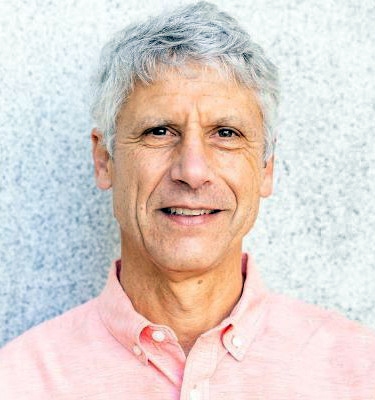An online masters degree in theology or divinity can help you build a solid foundation for pursuing careers in ministry and academia.

Studying theology can also be part of a personal quest to probe and deepen your faith and religious knowledge, including sharpening your sense of calling and vocation.
Editorial Listing ShortCode:
Some people of faith like to combine the study of theology with other career training in fields such as psychology, education, or social work.
Online Masters in Theology Programs
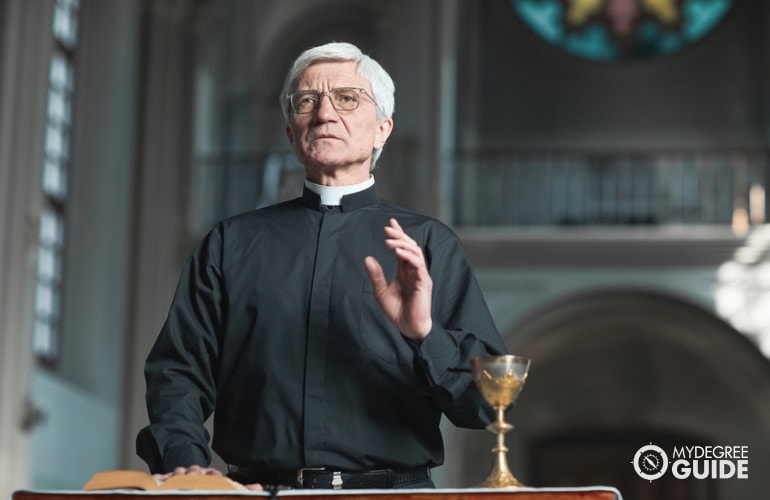
Getting an M.A. in Theology can help you develop foundational knowledge related to biblical studies, church ministry, theological doctrine, and church history.
Some theological studies programs focus more on academic training and research, while other programs focus on preparing students for ordination and pastoral leadership.
Editorial Listing ShortCode:
Graduate programs in theology typically offer training in areas such as:
- Biblical studies and scriptural exegesis
- Pastoral care and counseling
- Systematic theology and apologetics
- Evangelism
- Church history
- Church leadership
- Multi-cultural perspectives on religion
As you consider different online M.Th programs, you can look for concentrations that fit your goals. Concentrations may emphasize academic training in biblical scholarship and biblical languages, practical skills for pastoral care and church leadership, or more liberal cultural studies.
MA in Theology Specializations

Here are some common areas of theology specialization. Some focus more on intellectual and academic expertise, while others focus more on practical pastoral skills.
- Biblical Studies: This specialization involves close study of the Old and New Testaments, their historical roots, and the textual, moral, spiritual, and doctrinal aspects of scriptural interpretation.
- Religious Education: From homilies and Sunday school to faith-based education and global Christian outreach, this specialization focuses on preaching, teaching, and other forms of Christian messaging, education, and evangelism.
- Christian Leadership: If your career focus is on leading, growing, or planting a church, this specialization can help you learn up-to-date organizational leadership skills.
- Pastoral Counseling: A pastoral counseling specialization can help you gain the skills and confidence needed for leading counseling ministries, including youth mentoring, spiritual formation, couples counseling, and grief counseling.
- Apologetics: A specialization in apologetics can help you examine and test the limits of Christian doctrine and biblical interpretation. You can also learn how to explain and defend Christian doctrine in the context of contemporary culture.
Most master in theology programs emphasize core concepts in biblical and doctrinal studies, but considering specializations like these can help you find the best program that fits your interests and goals.
Theology Careers & Salaries
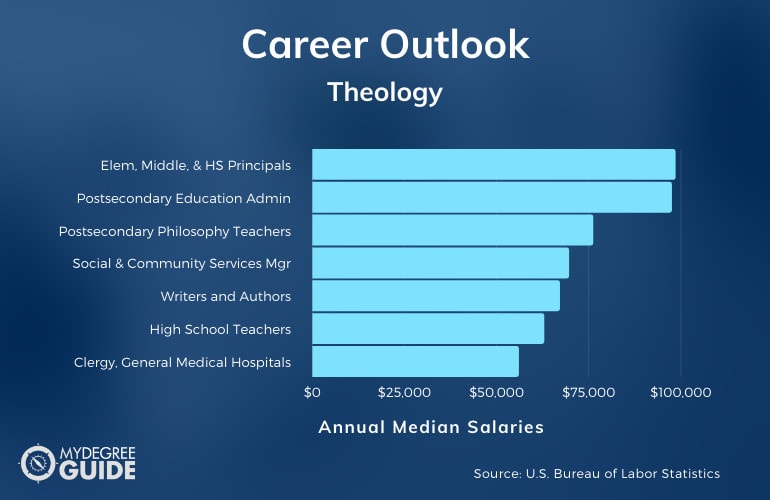
Getting an online masters in theology can be an important step in qualifying for some practical career opportunities in pastoral leadership, Christian ministry programs, or academia.
A meaningful, values-based, and ethics-based curriculum can help you build a spiritual foundation that fuels encouragement, compassion, perseverance, and success in a number of career and life pursuits.
According to the Bureau of Labor Statistics, there are a number of careers directly related to pastoral work, religious education, or community services that can offer religious studies majors rewarding, service-oriented roles.
| Careers | Annual Median Salaries |
| Elementary, Middle, and High School Principals | $98,490 |
| Postsecondary Education Administrators | $97,500 |
| Postsecondary Philosophy and Religion Teachers | $76,160 |
| Social and Community Services Managers | $69,600 |
| Writers and Authors | $67,120 |
| High School Teachers | $62,870 |
| Clergy, General Medical and Surgical Hospitals | $55,990 |
| Clergy, Nursing Care Facilities | $52,400 |
| Clergy, Religious Organizations | $46,720 |
| Directors, Religious Activities and Education | $45,110 |
Beyond pursuing jobs in academia or in religious ministry, education, and leadership, there are many other career paths you can pursue that may complement your Christian calling.
For many people, deepening one’s Christian faith and sense of vocation also means preparing for roles in service-oriented careers. This may include positions in social work, healthcare, nonprofit leadership, public policy, counseling, teaching, or organizational leadership.
Editorial Listing ShortCode:
Some people may even see their training in scriptural interpretation, apologetics, and moral philosophy as a foundation for future jobs in the legal profession. Others may decide to pursue an on-campus or online PhD in Theology or similar program.
Theology Master’s Curriculum & Courses

Curriculum and course options will vary by school and program design, but as a student of theological studies, you might take courses similar to these:
- An Introduction to Christian Theology: This course is a broad exploration of the Christian worldview, the biblical narrative, and related theological concepts.
- Church History: This course surveys church history and explores seminal events in early, medieval, and modern church history, such as the schism between the eastern and western churches and the Protestant Reformation.
- Introduction to Biblical Studies: This class is a rich overview of the key historical, cultural, doctrinal, and philosophical considerations essential to understanding and teaching others about both the Old and New Testaments.
- Biblical Exegesis: This course provides a comprehensive study in a variety of perspectives and practices used in the literal, historical, moral, spiritual, and doctrinal interpretation of Old and New Testament scripture.
- Old Testament Studies: You’ll learn about pivotal events in the Old Testament in the context of historical and cultural factors and in relation to theological doctrine.
- New Testament Theology: This class focuses on key features of New Testament scripture, including Jesus of Nazareth and his ministry, the writings of the Apostle Paul, and key areas of contrast between Old and New Testament theology.
- Pastoral Leadership: You’ll learn about effective frameworks for success in a senior pastor role, including organizational leadership skills, homiletics, and training in caring ministries and Christian education.
- Evangelism and Worship: This class explores various methods and concepts related to preaching the gospel in the context of larger worship practices.
- Research Methods in Theology: This course provides aspiring pastors and theologians with a solid foundation in relevant research tools, resources, and methods.
- Christian Education and Outreach: This course is an overview of the institutional structures, ministries, and methods fostering effective Christian formation and education.
This curriculum overview demonstrates the range and depth of personal growth and work-related competencies you may develop when pursuing a masters degree in theology.
Admissions Requirements

For admissions to most masters programs in theology or divinity, you’ll need a bachelor’s degree.
You may also qualify if you have equivalent academic accomplishments that have prepared you for the scholarly, linguistic, and analytical challenges of a theological studies program. Typical admissions requirements include:
- Bachelor’s degree in religion, theology, or related liberal arts majors
- A satisfactory college GPA
- GRE or GMAT scores (if required)
- A statement of faith or purpose
- Letters of recommendation
Admissions requirements can vary, and admissions policies may also vary as you consider programs at different institutions, such as traditional colleges, Bible colleges, or seminaries.
Accreditation
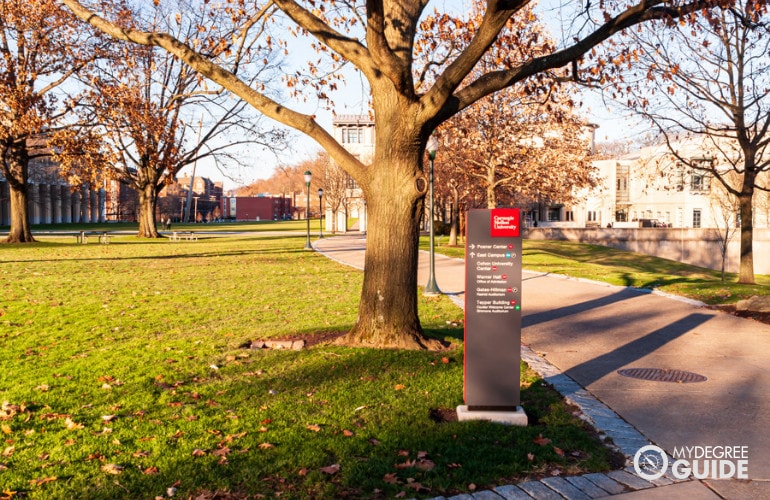
It is important to find out if you are pursuing a degree from a fully accredited school. Regional accreditation helps ensure your degree is honored by other schools, licensing boards, and future employers. Studying at an accredited school can help ensure that the academic quality and student services you’ll be receiving meet accepted standards.
Editorial Listing ShortCode:
Finally, accreditation can be a precondition for some forms of financial aid. Accreditation organizations, such as the Council for Higher Education Accreditation (CHEA), have more information about accreditation and finding accredited schools.
Theology Licensure and Certifications

A graduate study program in theology or divinity can help you prepare for a number of service-oriented careers. If this is your desired career path, thinking about licensure and certification early on can be beneficial.
Three common areas of licensing and certification complemented by theology programs include mental health counseling, teaching, and chaplaincy. Certification organizations in these areas include the following:
- Board of Chaplaincy Certification Inc. (BCCI)
- National Board for Certified Counselors (NBCC)
- Association for Clinical Pastoral Education (ACPE)
Requirements can vary depending on the organization and desired certification. Some religion degree online masters programs help ensure that you get the preparation needed to meet licensing or certification requirements, which can streamline the process.
Financial Aid and Scholarships

If you anticipate needing help covering the costs of your online masters program, you may consider applying for financial aid to see if you qualify.
Common forms of financial assistance include state and federal education grants, work study programs, need-based and merit-based scholarships, and student loans. The terms of loans and other forms of financial aid can vary, so it’s beneficial to look over all offers carefully.
If you’ll be applying for need-based assistance, filling out the Free Application for Federal Student Aid (FAFSA) could be a good starting point.
What Is a Theology Degree?

A theology degree is often a good first step toward working in ministry. Theology majors typically get systematic instruction in biblical studies, church history, and Christian doctrine.
Earning a theology degree may also involve specialized training in biblical exegesis, homiletics, apologetics, pastoral counseling, Christian formation, and church leadership.
A theology degree may be a way to deepen your religious faith and understanding, but when awarded by an accredited institution, it is also a formally recognized academic degree. Students can earn a bachelors, masters, doctorate, or PhD in Theology.
Should I Choose a University, Bible College, or a Seminary for My Studies?

When checking out master programs in theology, programs may be offered by regular colleges or universities, by Bible colleges, or by theological seminaries and divinity schools.
Which type of institution should you choose?
- University: A lay university typically caters to students from Christian and non-Christian backgrounds. It often does not endorse religious life even though it offers degrees in theology alongside other majors.
- Bible college: A bible college or Christian college may offer many majors but is usually taught by Christian faculty. This type of college usually endorses Christian values, recognizes Christian holidays, and fosters church-related activities.
- Seminary: A seminary or divinity school offers graduate-level programs in theology with a strong focus on Christian formation, biblical studies, and other theological studies or practical courses related to pastoral preparation.
It’s helpful to consider which course concentrations fit your goals and interests. As you consider online theology degree options, you may also want to determine which institutional orientation makes the most sense for you personally.
What Undergraduate Do I Need to Get a Masters in Theology?

For most online master’s degree in theology programs, you’ll be expected to have already earned a bachelor’s degree from an accredited school.
That said, most programs don’t have strict requirements about what kind of bachelor’s degree you have. In fact, some graduate programs see a benefit in recruiting students with diverse life experiences, academic backgrounds, and perspectives.
Editorial Listing ShortCode:
Of course, having a bachelor’s in theology, religion, or religious studies may help you be more prepared for many of the topics you’ll likely encounter in a masters of theology program.
What Can You Do with a Masters in Theology?

Earning your masters in theology can help you develop a strong understanding of Christian doctrine and develop your expertise in biblical study and interpretation. This degree can help you qualify for ordination and feel more confident about jobs in ministry and pastoral leadership.
You may wish to pursue a masters in theology and religion for your own personal growth or spiritual formation. This kind of personal development may also support your success in professional roles, especially service-oriented ones.
According to the Bureau of Labor Statistics, jobs for social and community service managers are forecast to grow 17% over the next ten years. Many committed and academically trained Christians also pursue licensure to serve in sectors such as psychotherapy, counseling, or education.
How Long Does It Take to Get a Masters Degree in Theology?

For some students, depending on the school and program, it can take 2 to 3 years to complete all the requirements of a masters degree in theology or divinity.
The time it takes you to finish can also depend on how long it takes you to complete a thesis or capstone requirement. If the program only requires 36 credit hours and no thesis, it may be possible to finish in 1 year with full-time study year-round, including the summer.
Is Ordination Possible After Earning an Online Graduate Degree in Theology?

There is no uniform set of requirements that qualifies someone for ordination. These requirements tend to vary significantly by denomination.
That said, some large Christian denominations require a Master of Divinity. The training you can get from a masters in divinity or theology program can help prepare you to work in pastoral roles in most denominations.
Aspiring pastors and ministers who plan to seek ordination can seek information from the associations governing ordination in their respective denominations.
What’s the Difference Between a Master of Divinity vs. Master of Theology?
A masters in divinity program is likely to emphasize preparation for ordination and working in a pastoral role. A masters in theology program might emphasize a more intensive academic preparation in theology.
| Master of Divinity | Master of Theology |
|
|
A divinity degree’s emphasis on preparing you for real-life work as a church pastor as opposed to a role in academia is probably what sets it the most apart from a theology degree.
Is a Masters in Theology Worth It?
Yes, a masters in theology is worth it for many students. A masters in divinity or theology can help equip you for careers in ministry and help qualify you for ordination in many denominations.
Editorial Listing ShortCode:
The Bureau of Labor Statistics projects 4% job growth for clergy occupations. Even if you don’t plan on seeking ordination or a pastoral career, you may still want a masters in theology if you want to study theology and deepen your knowledge of scripture and Christian doctrine.
Universities Offering Online Masters in Theology Degree Programs
Methodology: The following school list is in alphabetical order. To be included, a college or university must be regionally accredited and offer degree programs online or in a hybrid format.
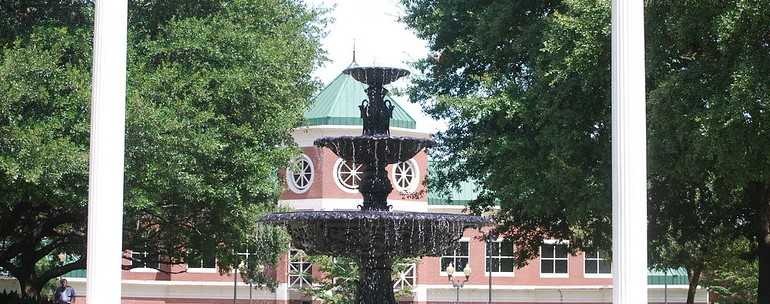
Belhaven University offers an online Master of Arts in Biblical and Theological Studies. The program requires 36 credit hours to graduate. Applicants must have a master’s degree with a GPA of 2.5 or greater. If applicants don’t meet the requirements, they may submit an essay and 2 letters of recommendation for review.
Belhaven University is accredited by the Southern Association of Colleges and Schools Commission on Colleges.

Biola University offers an online Master of Arts with a concentration in Theology. The program offers two tracks: Greek and Non-Greek. The Greek track allows students to learn the Greek used in the New Testament.
Applicants must have a bachelor’s degree with a minimum GPA of 3.0. They must also submit official transcripts, 2 essays, and 2 references.
Biola University is accredited by the WASC Senior College and University Commission.
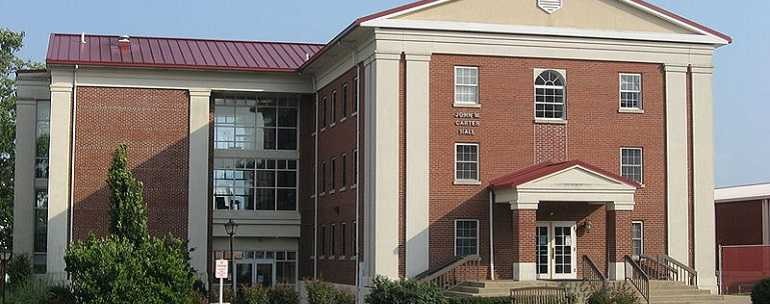
Campbellsville University offers an online Master’s in Theology. The program can typically be completed in 2 years, and its courses are 8 weeks long. Students may choose one of three specializations: Biblical Studies, Pastoral Leadership, and Theology. Applicants must have a bachelor’s degree and need to submit an essay and 2 letters of reference.
Campbellsville University is accredited by the Southern Association of Colleges and Schools Commission on Colleges.

Columbia International University offers an online Master of Arts in Theological Studies. The program requires 48 credit hours to graduate and can usually be completed in 2 years. Applicants must submit official transcripts, an application essay, and a reference from a church leader. A minimum GPA of 2.5 is needed to be eligible for the program.
CIU is accredited by the: Southern Association of Colleges and Schools Commission on Colleges.

Concordia University—Irvine offers an online Master of Arts in Theology. The program requires 32 credit hours to graduate and usually takes 2.5 years to complete. Students may choose to add one of five emphases. Applicants must have a bachelor’s degree in any field, a statement of intent, and 2 professional references.
Concordia University – Irvine is accredited by the WASC Senior College and University Commission.
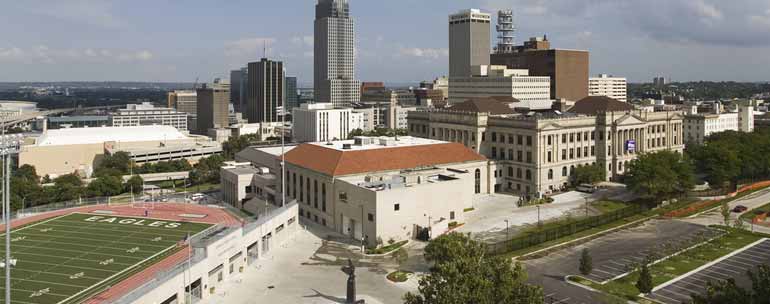
Creighton University offers an online Master of Arts in Ministry. The program offers 8 week terms. Students must complete 48 credit hours, including an internship, to graduate. Applicants must have a bachelor’s degree with a GPA of 3.0, 3 letters of recommendation, and a personal statement.
Creighton University is accredited by The Higher Learning Commission of the North Central Association of Colleges and Schools.

Fordham University offers a large variety of master’s degrees in theology, including Pastoral Studies.
Depending on the program, 36 to 60 credits are needed to graduate. Other graduation requirements vary depending on the program as well. Applicants must submit 2 letters of reference, all official transcripts, a resume, and a personal statement to be eligible. An interview must also be completed.
Fordham University is accredited by the Higher Learning Commission of the Middle States Association.

Franciscan University of Steubenville offers an online Master’s in Theology and Christian Ministry. Students must complete 30 credits from core courses and 3 to 7 electives. A GPA of 3.0 or higher needs to be maintained to graduate. Those interested in the program must have a bachelor’s degree with a minimum GPA of 3.0.
The Franciscan University of Steubenville is accredited by the Higher Learning Commission.

Fuller Theology Seminary offers an online Master of Arts in Theology and a Master of Arts in Theology and Ministry. Both programs require students to complete 80 credits to graduate, which often takes 4 years to complete. Applicants must have a GPA of 2.7 or higher and need to submit an essay and 3 references.
Fuller Theological Seminary is accredited by the Western Association of Schools and Colleges Senior College and University Commission.

Gonzaga University offers a Master’s in Theology and Leadership. Students must complete 30 credits to graduate. Though the program can be completed online, two campus visits are required. Applicants must have a GPA of 3.0 from a bachelor’s degree program, 2 letters of recommendation, and a writing sample.
Gonzaga University is accredited by the Northwest Commission on Colleges and Universities.

Harding University offers a Master of Arts in Theology, a Master of Arts in Christian Ministry, and a Master of Divinity.
Each program has different requirements: both Master of Arts programs require 48 credits, while the Master of Divinity requires 78. Applicants need to supply 4 references, including 2 from professors, one from a minister, and a character reference.
Harding is accredited by the Higher Learning Commission.

Liberty University offers an online Master of Theology. To graduate, students must complete 30 credit hours.
The program can typically be completed in 1.5 years and each course is 8 weeks long. A non-thesis track allows students to complete a capstone project instead. Applicants must have a GPA of 3.0 and a pastoral recommendation and need to complete a divinity questionnaire.
Liberty University is accredited by the Southern Association of Colleges and Schools Commission on Colleges.

Lincoln Christian University offers a Master of Arts in Theology. The program requires only 10 to 12 courses to complete it. Applicants must have a GPA of 2.5 or higher. They also need to submit an online application, 2 essays, and 2 character references from people in leadership positions at Christian organizations.
Lincoln Christian University is accredited by the Higher Learning Commission.

Newman University offers both a Master of Theological Studies and a Master of Arts in Theology. Both programs require students to complete 30 credit hours.
Students looking to obtain the MA in Theology must complete a thesis. Applicants must have a bachelor’s degree with a GPA of 3.0 or higher, a letter of recommendation, and a personal essay.
Newman University is accredited by the Higher Learning Commission.

Northwest University offers an online Master of Arts in Bible and Theology. To graduate, 36 credits must be completed. Students may start the program at six different start dates throughout the year. Applicants must submit an online application with official transcripts, a personal essay, and a recommendation from a pastoral or professional reference.
Northwest University is accredited by the Northwest Commission on Colleges and Universities.
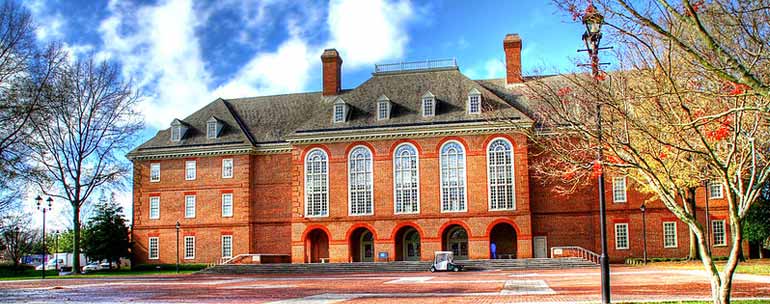
Regent University offers a Master of Theology. The program requires 24 credits to graduate and can usually be completed in 2 years.
Students may choose to add one of four concentrations to their degrees, such as Church History or Biblical Studies. Applicants must apply online and need to submit an admissions questionnaire and an academic writing sample.
Regent University is accredited by the Southern Association of Colleges and Schools Commission on Colleges.
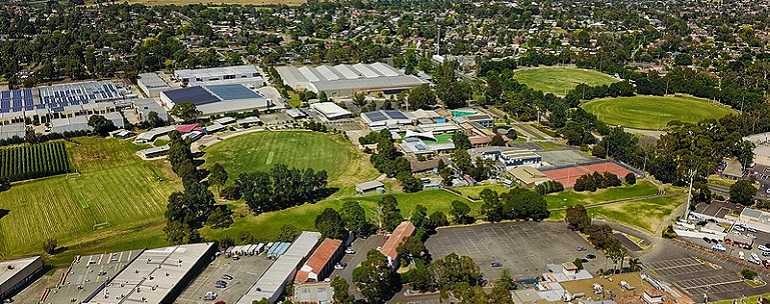
Saint Joseph’s College of Maine offers an online Master of Arts in Theology. Applicants must apply online and submit official transcripts to be eligible.
The program can typically be completed in a year and 6 months. Students may choose to add one of three specializations to their degree: Pastoral Theology, Sacred Theology, or Advanced Diaconal Studies.
Saint Joseph’s College is accredited by the New England Commission on Higher Education, Inc.
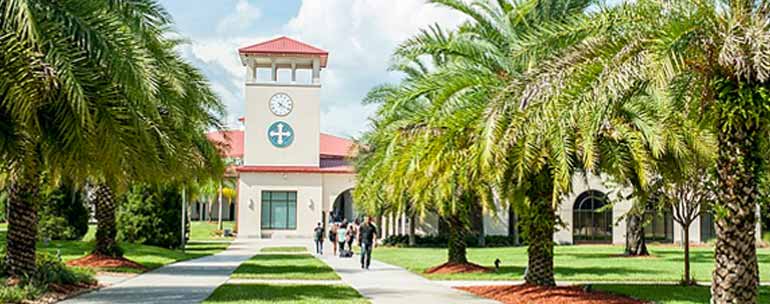
Saint Leo University offers an online Master of Theology. To graduate, students must submit 36 credit hours, with 9 credits open for theology electives. Applicants must have a bachelor’s degree with a minimum GPA of 3.0 and need to submit official transcripts, a professional recommendation, and a statement of professional goals.
Saint Leo University is accredited by the Southern Association of Colleges and Schools Commission on Colleges.
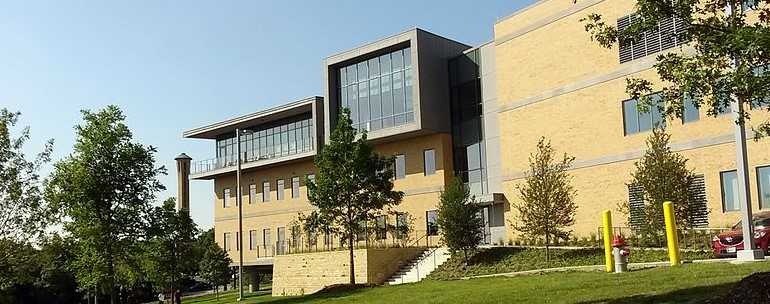
The University of Dallas offers a Master of Theological Studies. Students must complete 37 credit hours, including 3 credit hours dedicated to a capstone project.
An annotated bibliography must be submitted to graduate. Applicants must have a bachelor’s degree with a GPA of 2.75 and need to have 2 years of teaching experience and a letter of recommendation.
The University of Dallas is accredited by the Southern Association of Colleges and Schools Commission on Colleges.
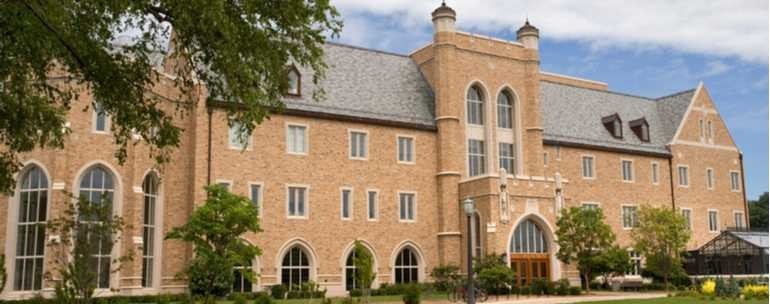
The University of Notre Dame offers an online Master of Arts in Theology. Applicants must submit 3 letters of recommendation and transcripts to apply.
Students must complete 36 credits to graduate. Students may choose between the Hybrid Residential Track, which requires on-campus summer courses, or the Hybrid Online Track, which has online summer courses.
The University of Notre Dame is accredited by the Higher Learning Commission of the North Central Association of Colleges and Schools.
Getting Your Masters in Theology Online

Getting your masters in theology might be a less traditional route, but it can lead to rewarding careers in a variety of fields. While a traditional career pathway can educate you, it’s possible that pursuing a masters in theology or divinity could truly inspire and transform you.
Advanced theological training can help you deepen your understanding of the scriptures and equip you for leadership, teaching, or serving roles in your local church or community. If you’re interested in a career in ministry, you can start your educational journey today by checking out accredited online theology graduate programs.

